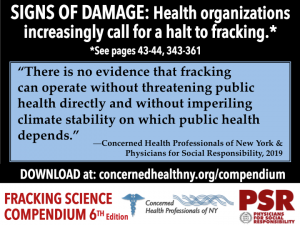From an Essay by Sandra Steingraber, Environmental Advocate, September 4, 2019
The 6th edition of the fracking science Compendium from Concerned Health Professionals of New York and Physicians for Social Responsibility finds signs of damage reflected in the calls of health professional organizations for bans or moratoria on fracking.
Health professionals and scientists in the United States and around the world are increasingly calling for the suspension of unconventional gas and oil extraction activities in order to limit, mitigate, or eliminate its serious, adverse public health hazards, including health threats from climate change.
In May 2015, the Medical Society of the State of New York passed a resolution recognizing the potential health impacts of natural gas infrastructure and pledging support for a governmental assessment of the health and environmental risks associated with natural gas pipelines.
The American Medical Association (AMA) adopted a similar resolution that supports legislation requiring all levels of government to seek a comprehensive Health Impact Assessment regarding the health and environmental risks associated with natural gas pipelines.
In May 2016, Physicians for Social Responsibility called for a ban on fracking.
In July 2016, the UK health professional organization Medact released an updated assessment of the potential health impacts of shale fracking in England, concluding that the United Kingdom should abandon its policy to encourage shale gas extraction and urged an “indefinite moratorium” on fracking.
In October 2016, a group of health care professionals in Massachusetts called for an immediate moratorium on major new natural gas infrastructure until the impact of these projects on the health of the communities affected could be adequately determined through a comprehensive Health Impact Assessment. The group noted that the operation of natural gas facilities increases the risk of human exposures to toxic, cancer-causing, and radioactive pollution due to the presence of naturally co-occurring contaminants, toxic additives to the hydraulic fracturing process, and through the operation of transmission pipelines.
Also in 2016, in a unanimous vote of the society’s 300-member House of Delegates, the Pennsylvania Medical Society called for a moratorium on new shale gas drilling and fracking in Pennsylvania and an initiation of a health registry in communities with pre-existing operations.
In 2017, health officials in Los Angeles called for a comprehensive health study in the aftermath of the massive methane leak in Aliso Canyon.
In March 2019, Doctors for the Environment Australia announced the reinforcement of its position that no new gas extraction of any kind should occur in Australia.
Concerned Health Professionals of New York, which provided scientific and medical guidance for the successful effort to ban fracking in New York State, has inspired affiliations of like-minded public health scientists and health care providers that have been advocating for moratoria or bans on fracking in various other regions.
These include Concerned Health Professionals of Maryland, Concerned Health Professionals of Ireland, Concerned Health Professionals of Neuquén, Argentina, and Concerned Health Professionals UK.
In addition to calling for a halt to fracking, groups of medical and other health professionals and scientists are issuing calls for comprehensive, long-term study of the full range of potential health and ecosystem effects of drilling and fracking. These appeals underscore the accumulating evidence of harm, point to the major knowledge gaps that remain, and decry the atmosphere of secrecy and intimidation that continues to impede the progress of scientific inquiry.
Published reviews and international governmental reports underscore the mounting evidence of health risks including developmental, neurological, carcinogenic, respiratory, reproductive, and psychological.
See pages 43-44 and 343-361 and footnotes 1409-1485. Read the science, and get the facts.
Download from: https://concernedhealthny.org/compendium/

